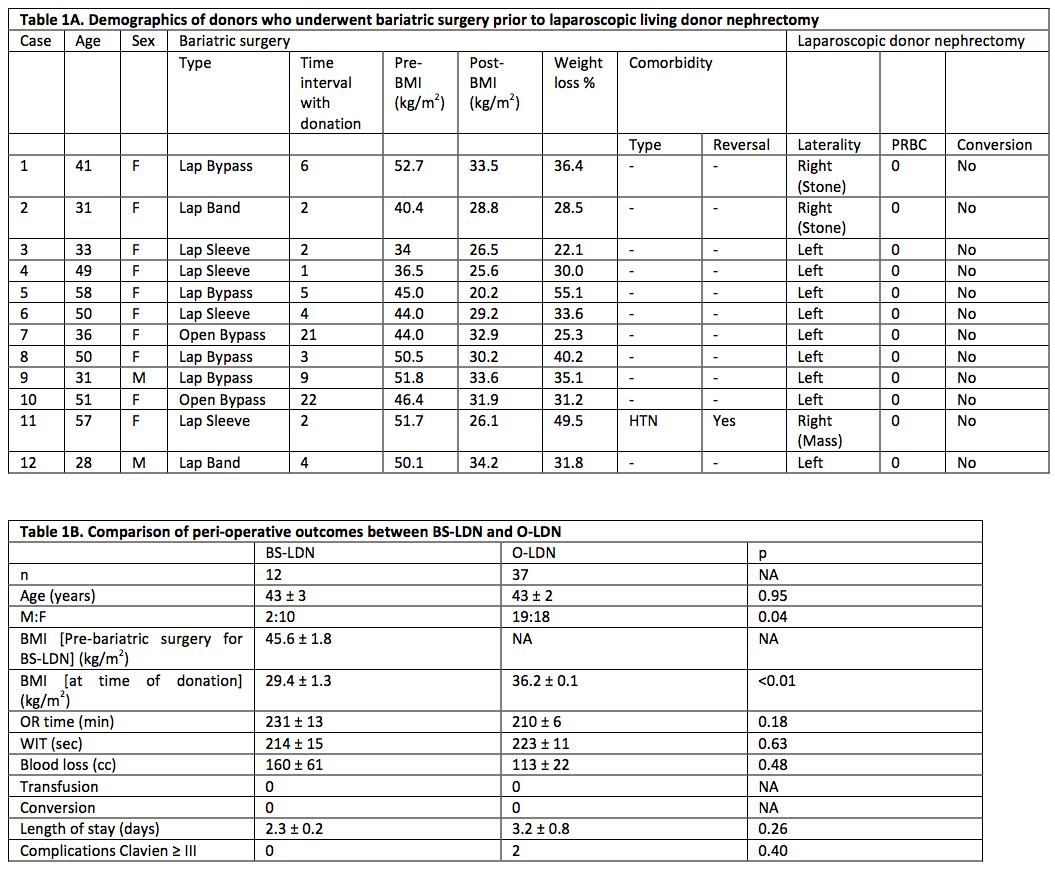Bariatric Surgery Prior to Living Kidney Donation: A Solution to Expand the Donor Pool.
Department of Surgery, Columbia University, New York, NY
Meeting: 2017 American Transplant Congress
Abstract number: 406
Keywords: Donation, Kidney transplantation, Obesity
Session Information
Session Name: Concurrent Session: Evaluation Decisions: Living Kidney Donors
Session Type: Concurrent Session
Date: Tuesday, May 2, 2017
Session Time: 2:30pm-4:00pm
 Presentation Time: 2:54pm-3:06pm
Presentation Time: 2:54pm-3:06pm
Location: E450b
Background: Living donor kidney donation rates have declined. Meanwhile, the number of morbidly obese people is increasing. They are frequently turned down for donation at many transplant centers. Their inclusion in the living donor pool after weight loss to a BMI<35 and reversal of comorbidities could reverse the downward donation trend. We investigated whether bariatric surgery in the morbidly obese altered their candidacy for donation, complicated their subsequent laparoscopic living donor nephrectomy (LDN), and impacted post-operative outcomes.
Methods: We retrospectively reviewed all LDNs at our institution between 2011 and 2016 (n=599). Donors who had bariatric surgery prior to LDN were identified and compared to those with a BMI 35-40.
Results: 12 donors had bariatric surgery 1-22 years prior to LDN (BS-LDN: 6 bypasses, 4 sleeves, 2 bands), none performed specifically in preparation for donation. 37 donor were obese with a BMI 35-40 (O-LDN). Of the 12 BS-LDN donors, 10 would have been excluded from donation prior to bariatric surgery based on a BMI>40 alone. All 10 lost sufficient weight to reach a BMI<35 prior to donation. 1 had obesity-associated hypertension which resolved after bariatric surgery. Prior bariatric surgery did not influence port placement and laterality of the laparoscopic LDN. None required open conversion or blood transfusion. Operative time, blood loss, warm ischemic time, and length of stay were comparable with O-LDN. None had early post-operative complications, while 2 O-LDN donors required post-donation exploratory laparotomy for small bowel and pancreatic injuries.
Conclusion: Bariatric surgery allows morbidly obese people who would be discouraged from kidney donation to become candidates, and does not complicate or impact the outcomes of the subsequent laparoscopic LDN. We thus advocate the consideration of bariatric surgery for morbidly obese patients in preparation of LDN. Determination of optimal timing will be important.
CITATION INFORMATION: Nguyen M.-T, Carpenter D, Mathur A, Van Bever J, Sandoval R, Ratner L. Bariatric Surgery Prior to Living Kidney Donation: A Solution to Expand the Donor Pool. Am J Transplant. 2017;17 (suppl 3).
To cite this abstract in AMA style:
Nguyen M-T, Carpenter D, Mathur A, Bever JVan, Sandoval R, Ratner L. Bariatric Surgery Prior to Living Kidney Donation: A Solution to Expand the Donor Pool. [abstract]. Am J Transplant. 2017; 17 (suppl 3). https://atcmeetingabstracts.com/abstract/bariatric-surgery-prior-to-living-kidney-donation-a-solution-to-expand-the-donor-pool/. Accessed February 19, 2026.« Back to 2017 American Transplant Congress
